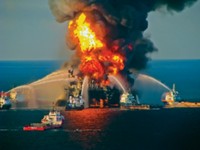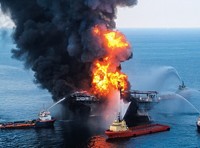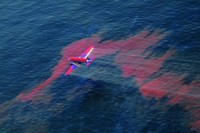Advertisement
Grab your lab coat. Let's get started
Welcome!
Welcome!
Create an account below to get 6 C&EN articles per month, receive newsletters and more - all free.
It seems this is your first time logging in online. Please enter the following information to continue.
As an ACS member you automatically get access to this site. All we need is few more details to create your reading experience.
Not you? Sign in with a different account.
Not you? Sign in with a different account.
ERROR 1
ERROR 1
ERROR 2
ERROR 2
ERROR 2
ERROR 2
ERROR 2
Password and Confirm password must match.
If you have an ACS member number, please enter it here so we can link this account to your membership. (optional)
ERROR 2
ACS values your privacy. By submitting your information, you are gaining access to C&EN and subscribing to our weekly newsletter. We use the information you provide to make your reading experience better, and we will never sell your data to third party members.
Environment
Spill Commission Goes To Congress
Senators voice support, criticism for Gulf oil spill report and indicate legislation is likely
by Jeff Johnson
February 7, 2011
| A version of this story appeared in
Volume 89, Issue 6
To mixed reviews, the cochairmen of the presidentially appointed National Commission on the BP Deepwater Horizon Oil Spill & Offshore Drilling took the commission’s 380-page report to Congress last month. At the center of attention for congressional members were the commission’s recommendations, which, if acted upon, would overhaul U.S. offshore oil and natural gas drilling practices and regulations.
Although the commission specifically examined only the BP Gulf of Mexico accident, which killed 11 workers and resulted in the world’s largest offshore oil spill, it said systemic problems plague other U.S. offshore oil and gas drilling activities—both in terms of government oversight and industry practices (C&EN, Jan. 24, page 24).
Shortly after the accident, the Department of the Interior embarked on a plan to drastically reform offshore regulations and oversight; that plan is just now being implemented. When speaking at the hearings, Commission Cochairmen William K. Reilly, former head of the Environmental Protection Agency, and Bob Graham, former U.S. Democratic senator from Florida, applauded that program but urged that more be done.
Concerning industry, the commissioners repeatedly said that oil companies and contractors must change how they drill and produce natural gas and oil in the U.S. seas. The three companies whose actions led to the disaster—BP, Halliburton, and Transocean—were criticized strongly in the report for technological mistakes and errors in judgment, and the commissioners said their behavior revealed a systemic fault within the oil industry.
However, several Congress members were not convinced.
At a Jan. 26 Senate Energy & Natural Resources Committee hearing, ranking minority member Lisa Murkowski (R-Alaska) zeroed in on the word “systemic,” telling Reilly its use “sets off its own controversy.” The commission, she noted, looked at the actions of only three companies of many operating in the Gulf. She compared the companies to two doctors who make fatal errors with a patient. “Therefore, somehow, do you hold the entire hospital staff responsible? Is that a fair assessment of the report’s conclusion?
“And if that is the case,” Murkowski continued, “have we just basically been lucky for the past few decades that a spill of that magnitude has not occurred with some of the other 14,000 wells in the Gulf?”
“Senator,” Reilly responded, “I would answer that question with one word—yes. There have been some 79 incidents of loss of well control in the Gulf between 1996 and 2009. Those are, in many cases, near misses and ‘lucky accidents’ that did not result in explosions or spills. It doesn’t mean a blowout occurred, but it could have happened. Loss of well control is not supposed to happen. It is a mistake.”
Most of the earlier wells, Graham added, were drilled in shallow waters, far from the mile-plus-deep wells being drilled today. These newer deepwater wells are far riskier and deserve greater industry and government oversight, he said. Also contributing to the need for greater oversight, Reilly added, is the oil industry’s growing dependence on more and more drilling contractors, such as Halliburton and Transocean that provide technical drilling support throughout the world.
Wyoming Sen. John Barrasso (R) echoed Murkowski’s concern about tainting the entire industry as a result of three companies’ actions. He also criticized the makeup of the commission’s seven-member panel, which he said lacked engineers and included an environmental leader.
But Louisiana Sen. Mary L. Landrieu (D), whose state was directly affected by the spill, defended the commission’s work. She too was initially “uncomfortable” with the commission’s membership, she said, but added that the members took a “balanced approach” in their investigation and final report. “The commission,” she said, “aggravated the White House and the President who appointed its members, as well as industry and environmentalists,” which in itself demonstrated “some sort of balance.”
Landrieu, however, also stressed to Reilly and Graham the importance of the oil industry to the Gulf region and the need for a “robust offshore oil and gas industry.” The commissioners agreed, noting the need for oil and gas will continue into the immediate future.
Of particular importance to the people in the Gulf region, Landrieu said, was the commission’s recommendation that 80% of Clean Water Act penalties be directed to Gulf of Mexico restoration. She said she would soon introduce legislation to enact this recommendation.
Graham estimated that at least $500 million per year over 30 years is needed to restore Gulf resources degraded by oil and gas drilling and other federal activities. The spill, Graham said, presents “a chance we may not have again” for restoration.
Several senators noted that Gulf restoration, as well as better regulatory oversight, brings up the need to engage the science community. Indeed, Graham said science was a key theme in the report. Sens. Jeanne Shaheen (D-N.H.), with support from Mark Udall (D-Colo.) and Maria E. Cantwell (D-Wash.), said she intends to introduce legislation to increase Gulf research.
New research, Graham said, should be preventive, rather than the “crisis research” after an accident occurs, which is the case today. The lack of knowledge, he said, was shown in how ill-prepared the industry was to respond to the accident.
Accident response would also be improved by another commission recommendation: the establishment of an independent, industry-funded institute to conduct cleanup activities and to oversee industry drilling practices.
Committee Chairman Jeff Bingaman Jr. (D-N.M.) asked whether the American Petroleum Institute, a trade association, couldn’t fill this gap. In response, Reilly said that although API has “tremendous technical resources,” both to develop standards and certify equipment, its role as an industry advocate makes it an inappropriate choice to run an independent oversight institute.
Throughout his testimony, Reilly pointed to the need to increase oversight funding. Regulatory funding, Reilly said, has declined continuously since 1984 while Gulf oil production has nearly doubled. The result, he added, is crippled oversight. As an example, he said, in California waters one inspector oversees six rigs; in Gulf waters the ratio is one federal inspector for 55 rigs.
Bingaman said the committee would develop legislation to include many of the commission’s recommendations.
As the hearing came to a close, Murkowski expressed fears that restrictions in the Gulf may stall exploratory drilling in the Arctic Ocean. She urged a “two track” process for the Arctic that would allow industry to move ahead on drilling in the Beaufort and Chukchi Seas, while studies continue to determine how to protect the Artic’s environmental resource.
Several sections of the report underscored environmental challenges in the Arctic Ocean—sea ice, extreme weather, remoteness, and the fact that the nearest Coast Guard installation is 1,000 miles from proposed drilling areas. However, Reilly indicated to the committee that such a two-track program was possible and noted that the commission specifically recommended against an Arctic drilling moratorium.
But Reilly endorsed Interior’s current plan to put off drilling in the area for a year or so while site-specific studies are done, noting that baseline environmental information recommended in the report would take at least three years to complete. He said drilling could take place in the meantime and recommended that industry step in and guarantee drilling safety and an adequate accident response.






Join the conversation
Contact the reporter
Submit a Letter to the Editor for publication
Engage with us on Twitter